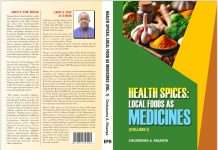
The Merriam-Webster Dictionary confirmed the definition of the word “superfood” as a food, such as salmon, broccoli, or blueberries, that is rich in compounds, such as antioxidants, fiber, or fatty acids, considered beneficial to the human’s body.
Although, there’s no scientifically based or regulated definition for superfood, but generally, a food is promoted to superfood status when it offers high levels of desirable nutrients and linked to the prevention of a disease, or is believed to offer several health benefits beyond its nutritional value.
A study published in the Journal of Physiological Anthropology explained that, superfoods with a high concentration of antioxidants and flavonoids enhance immunity and reduce inflammation in addition to preventing cancer and coronary heart diseases.
The nutrients they contain help promote a healthy complexion, nails, hair and increase energy levels as well as help maintain a healthy weight.
The study further shows that antioxidants are molecules that may help reduce the amount of damaging free radicals in the body, and therefore are believed to be health-promoting.
This justifies why nutritionists recommend inclusion of superfoods in your daily diet, to bolster your immunity and keep you healthy all day long.
7 Superfoods to eat daily
Berries
The higher levels of flavonoids in berries have been shown to lower the risk of a heart attack. A few commonly identified superfood berries include acai berries, blueberries, raspberries, tart cherries, cranberries, and goji berries.
Soy
Soybeans have a high concentration of isoflavones, a type of phytochemical. Phytochemicals are compounds that occur naturally in plants. Soy help reduce the amount of low-density lipoprotein (LDL) or “bad” cholesterol in the blood.
A study from the Neilson Global Health and Wellness Report, titled: “Healthy Eating Trends Around the World”, has shown that soy may prevent age-related memory loss. Soy isoflavones might also reduce bone loss and increase bone mineral density during menopause, as well as decreasing menopausal symptoms.
Green Tea
A study published in the Journal of Physiological Anthropology examined the effects of green tea, white tea, and water consumption on stress levels in 18 students.
The study suggested that both green and white tea had reduced stress levels and that white tea had an even greater effect. Larger studies are necessary to confirm this possible health benefit. Green tea may also have an anti-arthritic effect by suppressing overall inflammation.
Broccolis
People often identify kale, spinach, Swiss chard, beet greens, and collard greens as superfood leafy greens. These foods are rich in vitamins A, C, E, and K, and many B vitamins.
Leafy greens also contain an abundance of carotenoids, iron, magnesium, potassium, and calcium.
Salmon
The high omega-3 fatty acid content in salmon and other fatty fish, such as trout and herring, the risk of abnormal heartbeats, reduce cholesterol and slow the growth of arterial plaque.
Dark chocolate
Research has found that dark chocolate is high in flavonoids. Flavonoids demonstrates antioxidant activity by preventing coronary heart disease and certain types of cancer, and boost the immune system.
The component in chocolate specifically responsible for these benefits is cacao powder. Manufacturers derive this from cacao beans. Bear in mind that chocolate may have added ingredients, such as added sugar, that might negate these benefits.
Garlic
Scientists, co-sponsored by the US Department of Agriculture and the Pennsylvania State University, united at the first annual convention of “The Health Significance of Garlic and Garlic Constituents.” Studies done revealed that daily ingestion of garlic in a month diminished coagulation and the destruction of clots from 72 to 85 per cent. (I.e. lowers fat and cholesterol in the blood).
Garlic is rich in sugars, proteins, calcium, potassium, phosphorus, sulfur, iodine and silicone. In addition, it contains vitamins A, B1, B2, B3 and C.










